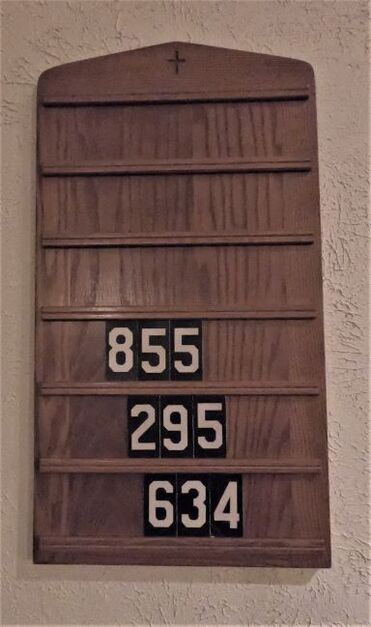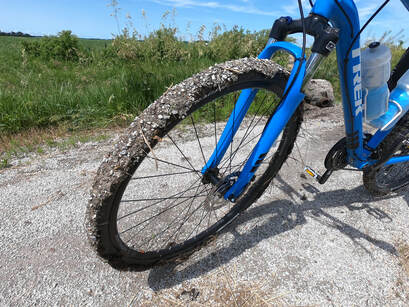 Near the end of the book of Jonah, the prophet finds himself high on a hill overlooking Nineveh. He waits there in anticipation of Nineveh being destroyed because he thinks it will be a great show. While he waits, the wind is hot and the sun is scorching, and so God, who is watching Jonah watch Nineveh, makes a little shade tree grow up next to Jonah to make his life a little easier. The next morning though, God has a little worm eat around the bottom of this shade tree and as the day progresses the tree shrivels up and dies. Jonah, left without his shade, expresses, over the death of the tree, that he is “angry enough to die.” There are many lessons to take away from the story of Jonah. That’s what makes it such a good story. The lesson that I’d like to offer from it today, from this particular scene, is this: The small things make all the difference. At the church where I am currently serving, at the front of the sanctuary, there are two boards that have the hymn numbers posted on them. There is one that faces the congregation and one that has recently been moved to make way for a worship banner. The one that was moved was placed so that it now faces the place where I stand to lead worship. Moving this sign has made it very easy for me to announce which hymn we are about to sing. I like to think this is helpful to those in the back that might not be able to see all the way up to the front. However, not all of the members who change the numbers on the sign every week are aware of the new placement of this hymn board. So, I was quite surprised the other morning when, after a month of easily announcing the hymns, MY numbers had not been switched. My immediate reaction was to begin trying to figure out who I needed to talk to, how to get more people to know about this great new placement for the hymn board, how much better it was for everyone, and especially for me because I didn’t have to peek around the corner any more to see the other board or worse, do the hard work of looking in my bulletin for the next hymn. Surely, I thought, people had a need to know, but before I got too far down this path, I was stopped by the Holy Spirit, and reminded that this sign is a very small thing that had just recently been moved. Further, I was reminded that over the course of my ministry there were any number of small things that I myself could be convicted of not doing. Small things that would have made the lives of more than just one person a little easier. It was a real moment of living in the prophet Jonah’s shoes and having what had become my very own shade tree taken from me. Now, I was never angry enough to die over this, but I was humbled by the Spirit, to realize just one of the many small things that others do for me that make my life easier. I was humbled as well to examine some of the small things that I could be more diligent about that would make the lives of those around me go easier. It is the small things in life that often go overlooked and are too easily taken for granted. We often remain unconscious of them until they are suddenly taken away, which then leads to the sort of quick unthinking anger that Jonah and I express in our respective stories. For this reason, the call that is inherent in this story is not just the humility to let go of others’ faults and the humility to recognize your own, it goes deeper than that. What is inherent is a call to open our eyes, to look more closely and more deeply and see where the unexpected and as yet unknown shade trees are in our lives. It is a call to see them, see what it is that they do for us, and then to let God and anyone else who has planted them know that their work is recognized, appreciated, and will be missed when it is gone. Finding these small subtleties of life is not an easy task. To help in your search, you might try a Web Prayer.
0 Comments
One of my hobbies is riding rail/trail bike paths with my wife. These trails, if you have never been on one, follow abandoned rail right of ways. The rails have been removed and a layer of chipped limestone covers up the ballast. This new surface is then packed down and a great surface is created for riding, walking and running on. Since they follow old rail lines, these trails tend to cover quite a bit of rural territory and go across country roads every few miles. On this particular day, we were riding the day after a fairly good rain had come through and though the path was fine, we had to cross a road that had gotten quite muddy. Crossing that road caked the tires of our bikes in mud and as soon as we got back on the trail, the mud began to pick up all the limestone bits it could stick to. We stopped and tried cleaning off the tires with some sticks and leaves that we found trailside, but we doing so seemed to be getting more mud on us than we were getting off of the bikes. So we went with plan B, just ride on it for a while. We were pleasantly surprised, that as bad as this looks, over the course of the next mile or so, the mud dried up, cracked off, and flew away, leaving clean (ish) tires and just a little bit of dried mud that flaked off easily later in the day. I can't say that it is the case for every problem one encounters, but there are a good many things in life where the best thing to do is simply keep moving forward, and let things work out on their own. In the moment, the mess that is already there may seem awful, but trying too hard when ill equipped, can tend to just make a bigger mess out of the situation. By waiting a while, and seeing what becomes of your mess, there are often many things that sort themselves out naturally and later, when you aren't in the heat of the moment you can see a little better what still needs to be taken care of and it is often much easier to take care of then.
|
AuthorPatrick Sipes is the founder and director of The Forming Spirit. You can learn more about him here. Archives
December 2020
Categories |

 RSS Feed
RSS Feed
